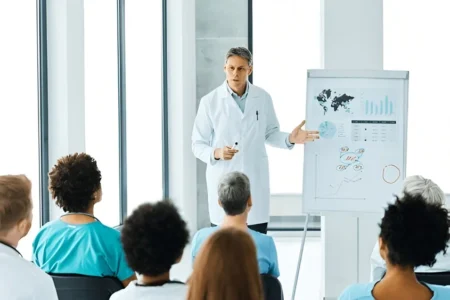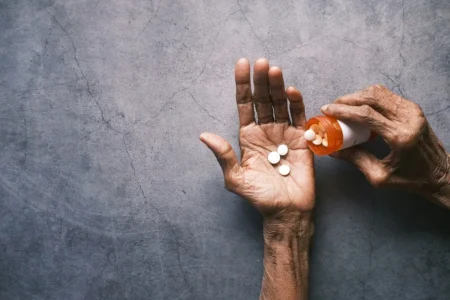How to Manage Total Daily Energy Expenditure for Fitness?
- Updated on: Jul 1, 2024
- 3 min Read
- Published on Sep 2, 2022

Good health and a fresh mind regenerate the body and extend the longevity of someone’s life. But to make a perfect and healthy life, it is very necessary to manage our daily life energy consumption. Sometimes we take less energy and work more or consume less. Most people fail to manage a healthy life due to busy routines. But actually, managing health and energy is more important than time and money for being more productive and efficient in work.
Meaning of Calories, TDEE and REE
Energy in the human body is measured by a unit called calories. To manage daily life energy expenditure, it is very necessary to measure or count daily basis calorie intake of energy by a person. And also take the measure of work you are doing.
TDEE means total daily energy expenditure. It is the number of calories taken by a person in 24 hours. It is the energy that is taken in the body in the form of food. The minimum calories of TDEE for every person is different depending upon the type of work of every person.
REE is all of the energy needed by a body in rest is called resting energy expenditure. The number of calories for REE must be the least for the body for the proper performance of digestion, vision, working of the brain, and other metabolic processes in the body.
Factors Affecting Total Daily Energy Expenditure
Maintaining daily expenditure of energy is very important for the person. Calories must be counted by every person to make plans for a healthy life. Many factors are affecting daily energy expenditure of a person such as;
- Age
- Gender
- Weight
- Height
- Illness
- Genetics
- External environment
- Routine Activities
In the meantime, factors such as hormones, genetics, an active lifestyle, a quick metabolism, and larger body weight may cause your TDEE to increase. In contrast to fat, muscle is metabolically active tissue. This indicates that even when at rest, muscle burns more calories. Additionally, when you have more muscle mass or are in the process of adding more muscle, hormonal changes might raise your energy consumption.
How to Increase TDEE?
Include extra physical exercise throughout your day to increase your daily energy expenditure. Given that the most important determinants of TDEE, such as your EER, are beyond your control, engaging in physical activity is the simplest approach to altering your TDEE
Specifically scheduled exercise and adding more movement to your day by walking more and sitting less are two short-term techniques for raising your TDEE. Long-term approaches include increasing your muscle mass, cutting down on dieting time, which can slow your metabolism, and consuming a nourishing diet richer in protein.
Ways to Boost Your Daily Energy Expenditure
Here are some ways to increase your daily energy expenditure. You must adopt these measures in your life to become healthy.
- Cleaning your residence or a specific space.
- Around the block or accompanying a pet on a walk.
- Setting a timer (or watch) for periodic periods of movement ascending stairs (instead of an elevator or escalator).
- Select a parking space more distant from the location you’re going.
- Arranging a walk-through meeting.
- Standing at a desk instead of sitting at a table. Purchase a standing desk or a workstation with adjustable heights for both sitting and standing.
Make standing the norm and only sit when necessary. If purchasing a standing desk is out of your price range, you can put your laptop on top of a stack of books or choose from a variety of reasonably priced risers. Mini treadmills are sometimes placed at the bottom of stand-up desks so that users can walk while still using the computer.
- During your break, get some exercise. Instead of scrolling through Instagram during your 15-minute break, take a few laps around your home or workplace, climb some stairs, stretch, or hold a plank posture for a few seconds.
- Place items you frequently use on the other side of the room so you have to get up and walk over to them whenever you need them. Consider taking a 5-minute break every hour to obtain a glass of water from a separate room rather than having a water bottle at your desk.
- Instead of driving when you need to conduct errands, try to start walking more frequently.
Use the Calculator to Manage TDEE
You can use the Mifflin-St Jeor Formulas to calculate your daily energy expenditure. Knowing your TDEE will help you determine whether you are moving around enough, and since it estimates your current calorie burn, it may also have an impact on your weight loss plans. With the help of this estimate, you can reduce calories to induce weight loss or increase calories to induce weight gain. Nowadays, tdee calculator is used for this purpose.
Conclusion
Your ability to lose weight will greatly depend on your ability to calculate your daily energy expenditure. Knowing where to start can help you gauge how far you have to go to reach your fitness goals. Finding opportunities to be active in our increasingly sedentary society is getting more and more difficult, but it’s still feasible if you use a little creativity. Over time, small adjustments here and there can add up to significant improvements, and before you realise it, you’re even closer to realising your objectives.












